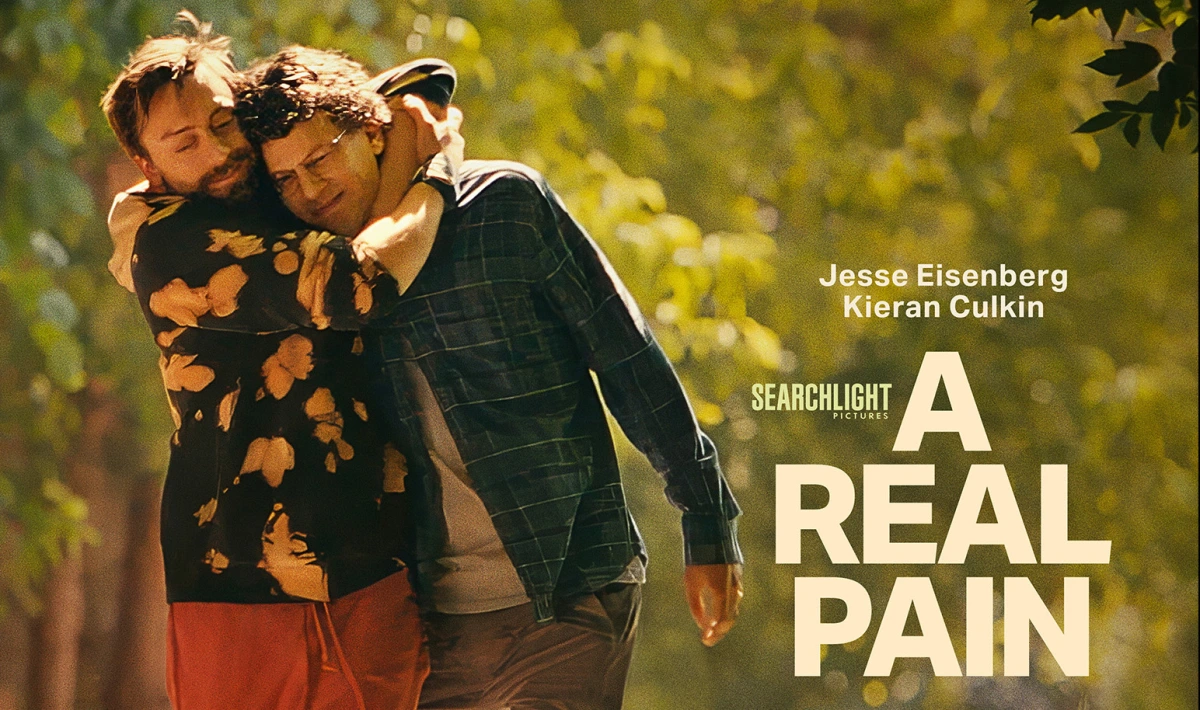A Real Pain, directed by Jesse Eisenberg, is a film that blends comedy and drama to explore complex emotions. The movie focuses on David Kaplan, played by Eisenberg, a reserved and anxious man who travels to Poland with his charismatic yet troubled cousin Benji Kaplan, portrayed by Kieran Culkin. The cousins took a Holocaust tour, intending to visit their grandmother’s childhood home. The film offers a thoughtful exploration of family dynamics, grief, and self-discovery.
The film premiered at the 2024 Sundance Film Festival, where it received widespread critical acclaim. Eisenberg’s directorial debut has been praised, with his portrayal of David earning significant recognition. Kieran Culkin’s performance also stood out, earning him a Golden Globe Award for his role. The movie delves deeply into the strained relationship between David and Benji, which becomes even more complicated during their journey. The film’s conclusion is deliberately open-ended, leaving viewers to interpret the characters’ emotional state and the future of their relationship.

A Real Pain Ending Explained
One of the film’s most poignant moments occurs at the end when Benji is seen sitting alone at an airport. After returning from Poland, David offers to share a taxi or have Benji come home with him, but Benji declines and chooses to remain. The final shot shows him observing strangers, leaving the audience to wonder about his emotional state. Benji’s decision to stay suggests he feels displaced, uncertain, and unable to move forward, needing more time to process his emotions.
There are multiple interpretations of Benji’s presence at the airport. At the start, he is already there, implying he might be homeless. His phone is unreachable when David calls, emphasizing his disconnection from the world. Culkin offered an interesting interpretation during the 2024 SCAD Film Festival, suggesting that the final scene could be something David imagines, reflecting his fear of what Benji might do next. This opens up various emotional interpretations about Benji’s fate.
A Grandmother’s Home: Unfulfilled Expectations
David and Benji’s trip to Poland includes a visit to their grandmother’s childhood home. After spending time with their Holocaust tour group, the cousins separate to visit the house in Krasnystaw, where their grandmother lived. Neither David nor Benji knows what to expect from the visit, but the house turns out to be unremarkable. However, the visit sparks a memory for Benji of their grandmother slapping him once, an event he recalls as “the best thing that ever happened to him.” This reveals the complexity of their family relationship and their differing memories.
David suggests a sentimental gesture of placing a rock on the stoop of the house, a Jewish tradition to honor graves. However, their simple act of remembrance is interrupted by a neighbor who doesn’t speak English. He calls in his son to translate, and the cousins explain that the rock placement is a meaningful tribute. The son, however, informs them that the rocks are a tripping hazard and should be moved. This encounter emphasizes the disconnect between the cousins’ emotional intentions and the practical realities of the world around them. Much like other moments in the film, this visit does not provide the closure they hoped for, nor does it offer the emotional resolution they expected.

The Strained Relationship Between David and Benji
David and Benji’s relationship was once close, but over the years, they drifted apart. As children, they were inseparable, but as they grew older, their lives took different paths. David became absorbed in his family life, focusing on his wife, child, and career, while Benji struggled to find his place in the world. The emotional gap between them widened, especially after Benji’s suicide attempt, which occurred six months before their trip to Poland. Benji’s overdose on sleeping pills left David deeply shaken, and he could not bring himself to visit or check in on his cousin.
David’s memories of Benji lying unconscious after the overdose haunted him, and he struggled with an overwhelming sense of guilt and fear. This guilt left him unable to reconnect with Benji, leading to months of distance. However, the trip to Poland becomes an attempt to mend their relationship. By the end of their journey, there is a moment of emotional reconciliation between them. They share a heartfelt hug, signaling that their bond has been somewhat repaired, but it is clear that both still have significant emotional work to do. Their relationship is on the mend, but unresolved pain lingers.
Benji’s Impact on the Holocaust Tour
During their time in Poland, David and Benji join a Holocaust tour led by James (Will Sharpe). As the group visits historical sites, Benji grows frustrated by how the tour treats the Holocaust as a mere list of facts. He criticizes James for not focusing on the emotional connection and significance of history, arguing it deserves a more heartfelt approach.
Benji’s feedback deeply affects the tour. When the group visits the Majdanek concentration camp, James takes Benji’s criticism to heart, reducing factual information and encouraging a more reflective, quiet experience. This change highlights the importance of emotional engagement with history, rather than treating it as a distant subject. James expresses gratitude for Benji’s honest feedback and plans to apply it in future tours.

Exploring the Deeper Meaning of A Real Pain
A Real Pain is more than a story about two cousins on a journey of self-discovery. The film raises significant questions about identity, grief, and the complexities of the human condition, especially the Holocaust’s impact on contemporary life. Benji’s frustration with the Holocaust tour critiques Holocaust tourism and its risk of reducing tragedy to facts and statistics.
The film also tackles both collective and personal grief. As the cousins process their grandmother’s death, they each navigate pain. David suppresses his emotions, focusing on his family and responsibilities, while Benji’s pain is more visible and self-destructive. They struggle to reconcile their identities, especially with their Jewish heritage. Their visit to their grandmother’s home represents their attempt to connect with their roots, but their expectations remain unmet.
Ultimately, A Real Pain challenges viewers with difficult questions and no easy answers. It explores the human capacity for pain, the complexities of relationships, and the search for meaning in life and history. The film leaves the audience reflecting on its layers, offering a deep examination of identity, grief, and the ways we process pain.





